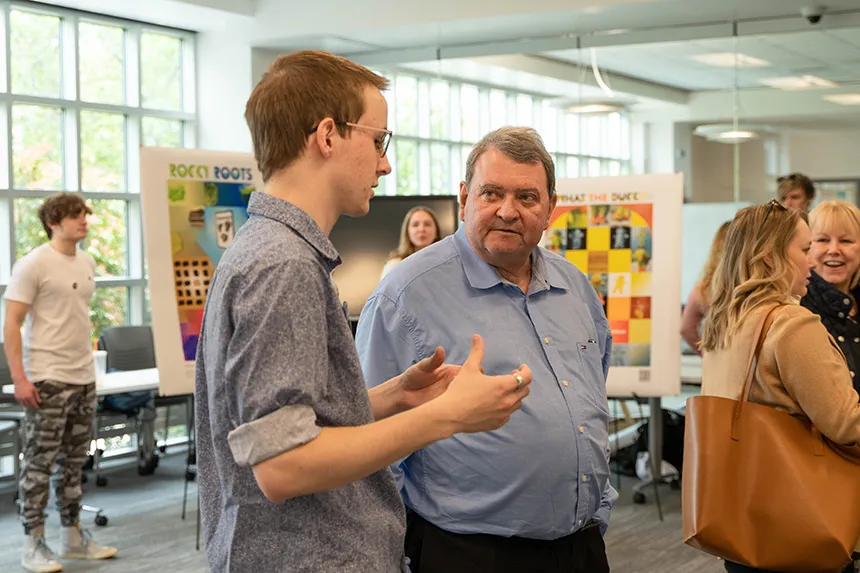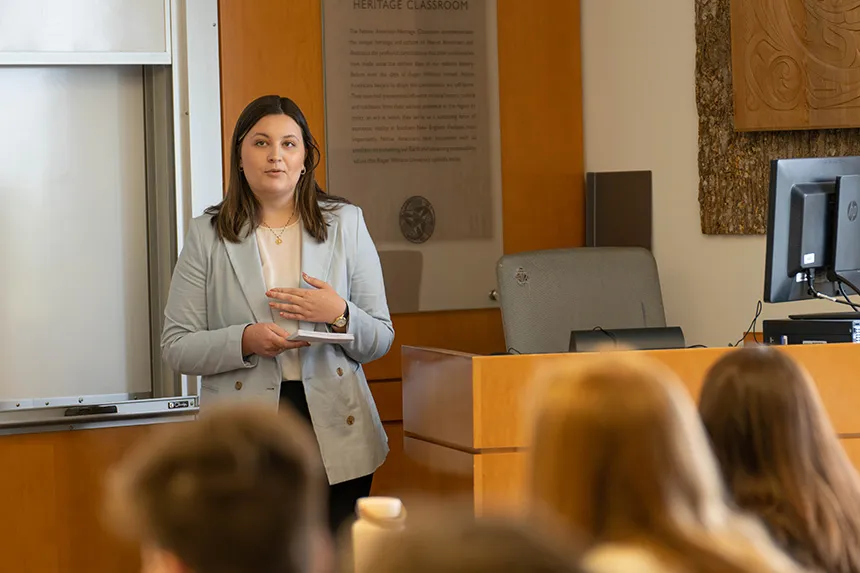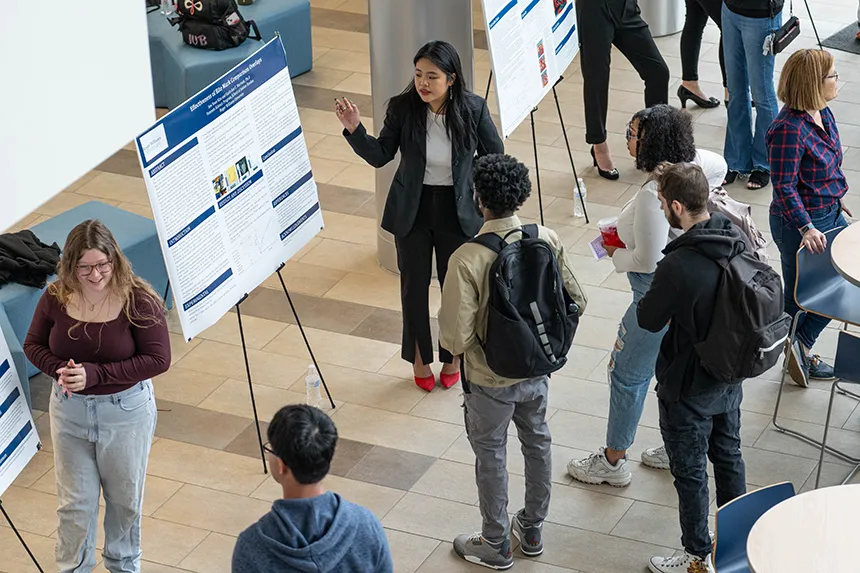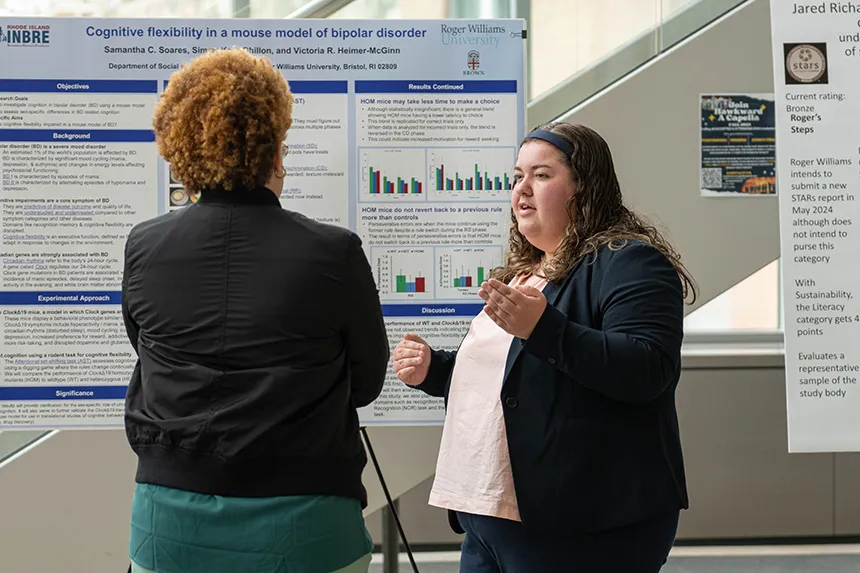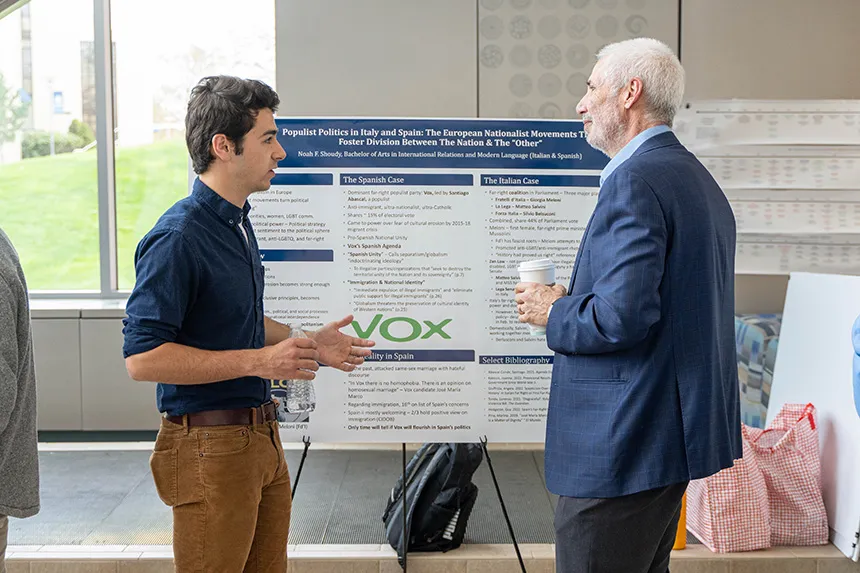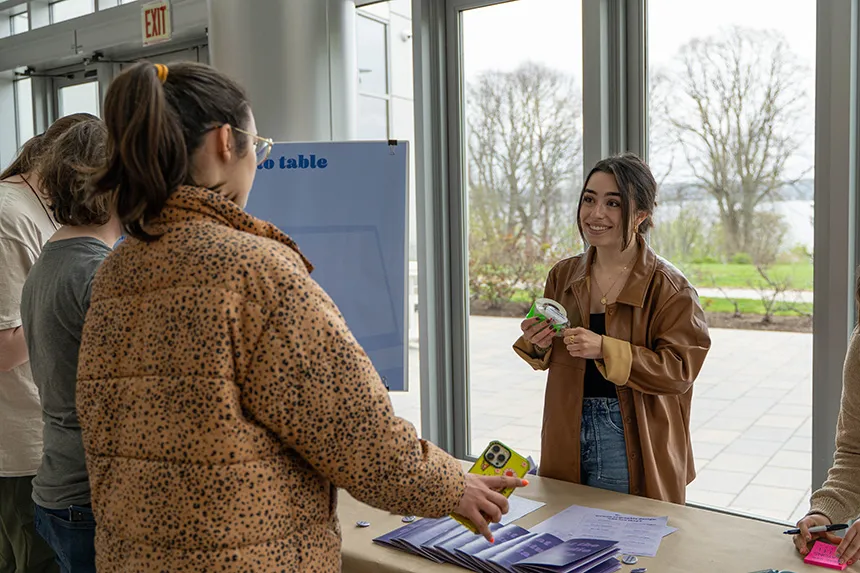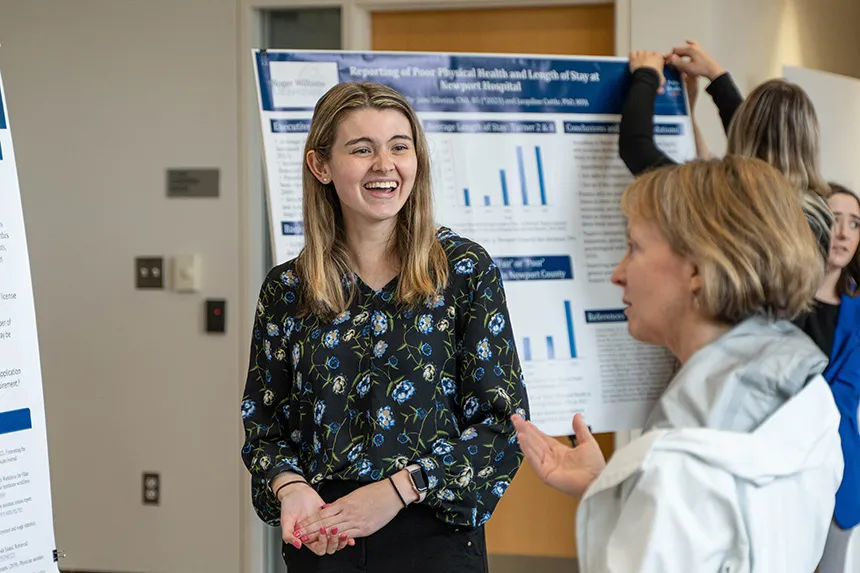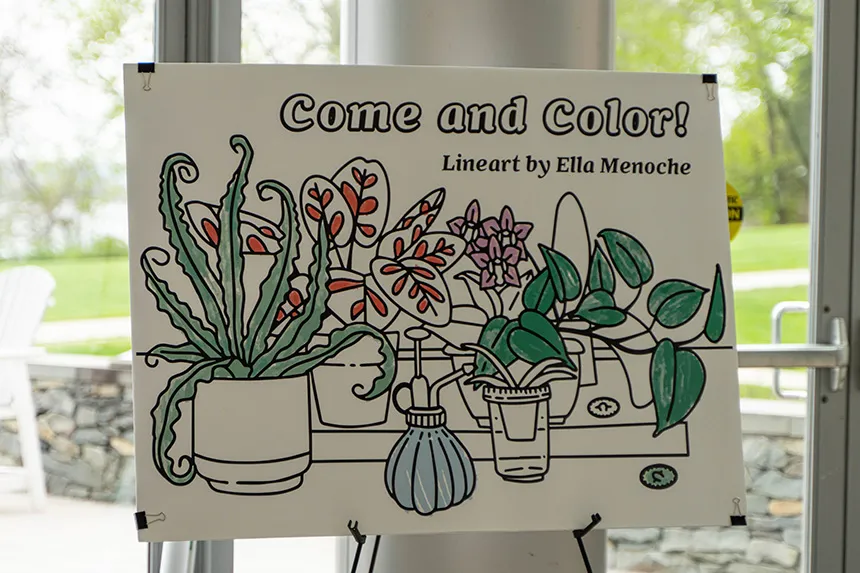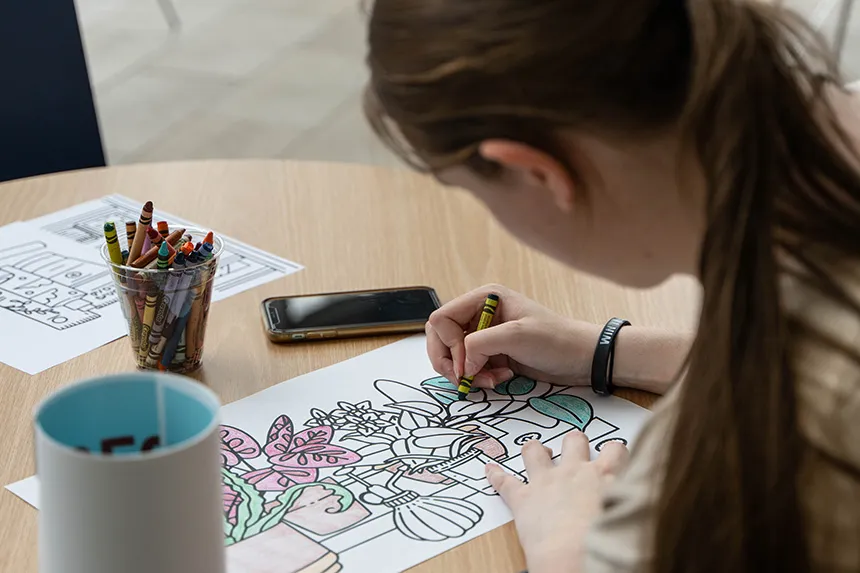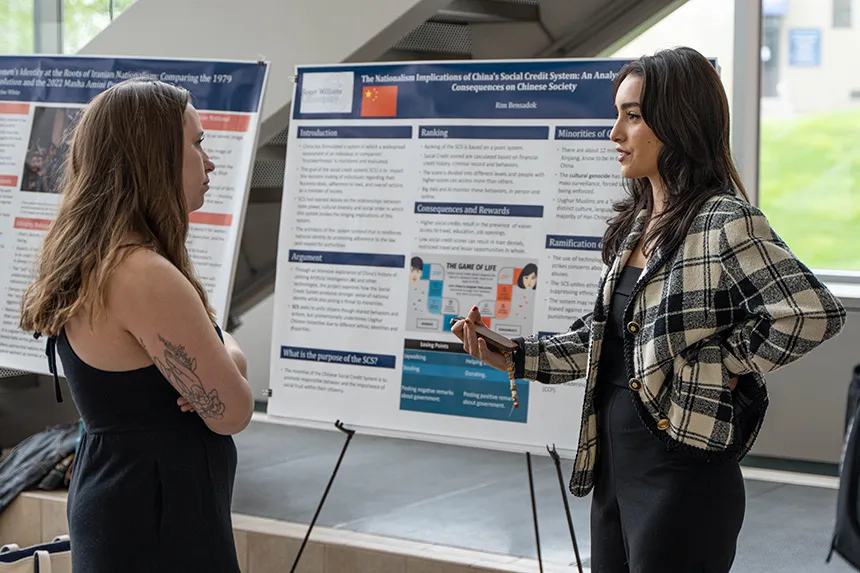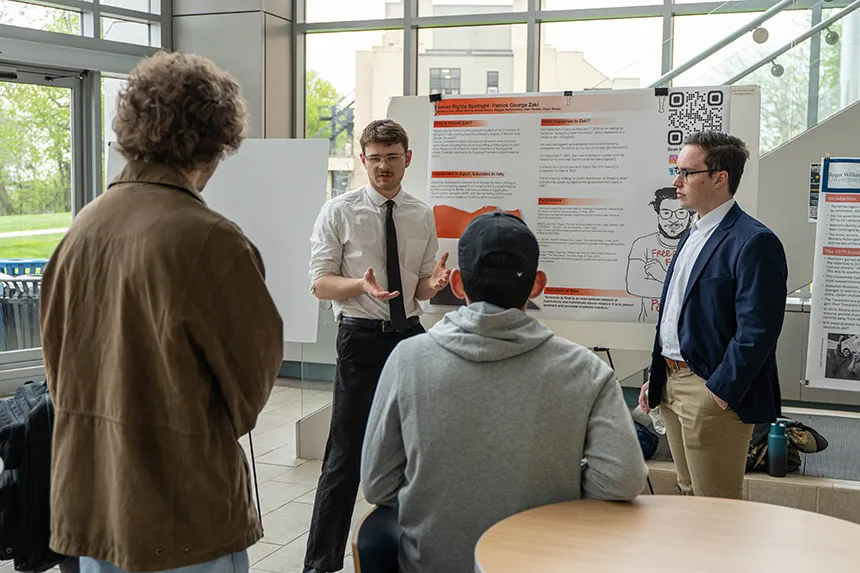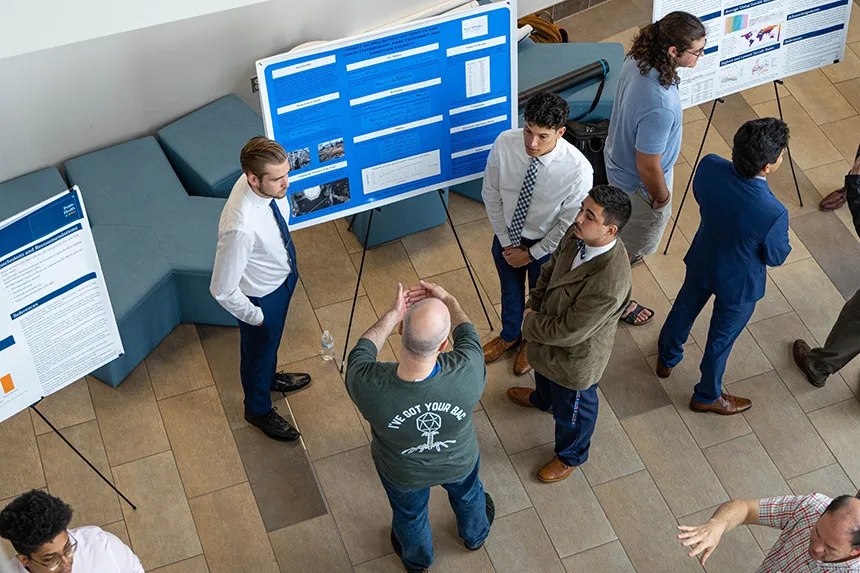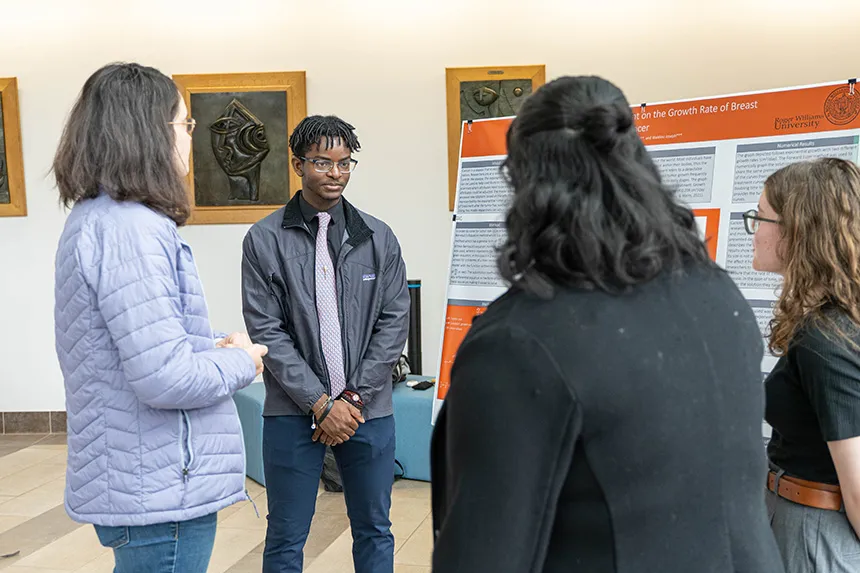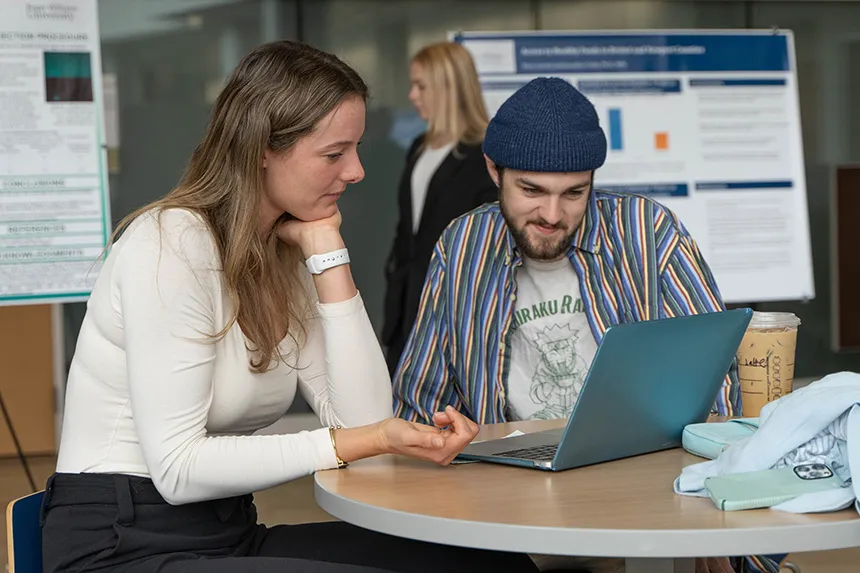Innovative Student Research on Display at 10th Annual SASH
At the Student Academic Showcase and Honors, students presented research and capstone projects for the RWU community and celebrated academic achievements
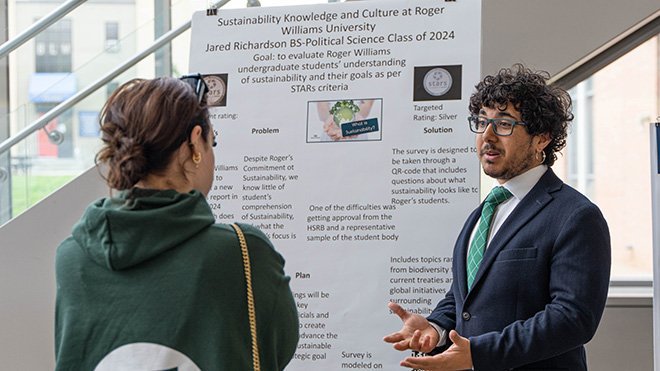
BRISTOL, R.I. – As a child, Lucero Blanco loved writing and illustrating stories. She also loved fish. Now, as a junior at Roger, she’s combined her academic studies in STEM and the arts by creating a graphic novel featuring elements of marine biology, which helped her land an internship at Nickelodeon Studios this summer.
Blanco, a first-generation student from Norwich, Conn., presented her graphic novel as part of the 10th annual Student Academic Showcase and Honors (SASH) held on Wednesday, April 26. Celebrating creative and cutting-edge research, SASH is a time for undergraduate and graduate students from across all schools to share their academic research, Honors Capstone projects, and senior theses as well as participate in artistic performances and panel discussions.
“SASH is a wonderful moment to celebrate research and creativity across all of our programs. This year, the breadth of projects, the poise of our students in presenting their work, and the evidence of faculty mentorship really blew me away,” said Margaret Everett, Provost and Senior Vice President for Academic Affairs. “From Engineering and Criminal Justice to Public Health and Journalism, our students are asking and answering important questions. Many of the presenters I had the chance to speak with at SASH are graduating seniors, and they are more than ready to go out into the world and do great things.”
Here's a sampling of the more than 200 projects shared at SASH 2023:
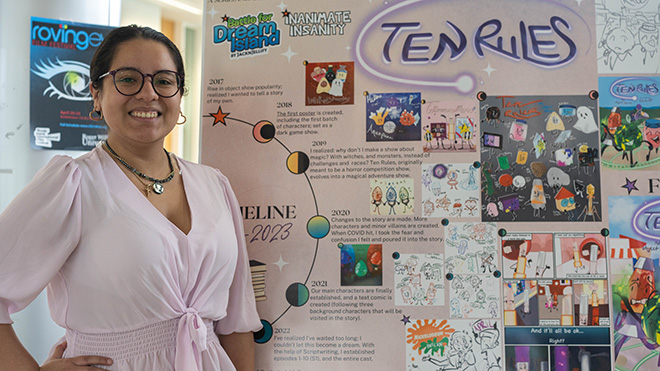
Designing a Graphic Novel
Junior Lucero Blanco, of Norwich, Conn., wanted to find a way to combine her love for STEM and the arts, so she used her Creative Writing and Graphic Design Communication double major and Marine Biology minor to create a graphic novel called “Ten Rules.”
Featuring marine-related characters Fire Coral, Jellyfish, and a Barreleye Fish whose coral reef home has been destroyed, the graphic novel centers around different objects and creatures having magical adventures and mishaps. Blanco wrote the text in a scriptwriting class last year and illustrated more than 135 pages this semester, printing half the story to share at SASH.
Thanks to this project and her overall portfolio, Blanco said she’ll be working as a studio intern at Nickelodeon in Los Angeles this summer.
“If this story could help me gain an internship at Nickelodeon, I’ve learned it’s something that I should keep working on. Maybe one day it could get published, or it could become something even greater,” Blanco said. “The graphic novel has helped me so much. Working with Professors Nikki Juen and Ted Delaney gave me the confidence to get my story out there.”
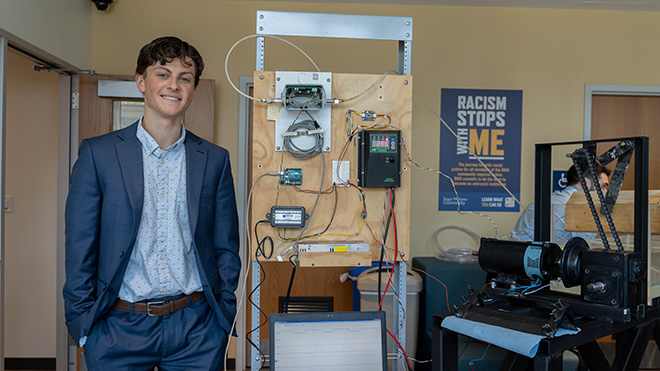
Making Waves with Senior Engineering Capstone Project
To help researchers study the serious environmental issue that is coastal shoreline erosion, a group of six Engineering majors designed and built a Wave Generator Machine as part of their Engineering Senior Capstone project.
The students’ wave tank will allow for the controlled creation of waves of different heights, frequencies, and directions, providing researchers with a platform to test the effects of waves on various types of shorelines. This machine was specifically built for Pamela Judge, Assistant Professor of Engineering at RWU, who is performing experiments to see how biopolymers can help strengthen the soil and reduce coastline erosion, explained Luke Calabrese, a Mechanical Engineering major from Watertown, Conn.
“In doing the project, I got relevant, hands-on experience, which is essential for any engineer,” Calabrese said. “I think it’s really important that I got to see a project all the way through – from brainstorming to designing it in CAD software, experiencing the problems that came along the way, and actually building a functioning (wave tank) – it was super rewarding. Knowing how to do all this is essential going into the workplace.”
After graduating in May, Calabrese will work for MTU Aero Engines North America in Rocky Hill, Conn.
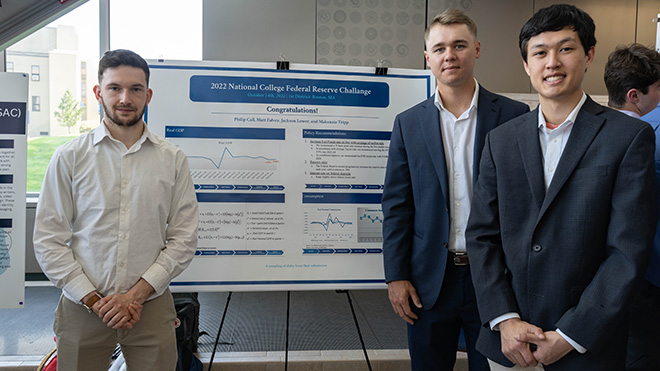
Recommending Policy Changes to the Federal Reserve
Using the knowledge and skills they’ve learned in their Economics classes, four business students presented a sampling of slides from their submission to the 2022 National College Federal Reserve Challenge. As part of the annual challenge, teams of undergraduate students analyze current economic and financial conditions and create monetary policy recommendations for the Federal Reserve, the central bank of the United States.
“I learned a lot about applying things we learned in our Economics classes to real-world examples like this: taking real data that the country is using,” said senior Matt Falvey, an Economics major from Walpole, Mass.
Last summer, Falvey, along with senior Jackson Lower, an Economics and Political Science double major from Medway, Mass.; senior Makenzie Tripp, an Economics and Finance double major from Schenectady, N.Y.; and junior Phillip Call, an Economics and Finance double major from Medfield, Mass., began this independent study project by researching the different segments of the economy before determining their policy recommendations.
“This was a good lesson and good experience on data collecting, and it also improved our presentation skills,” Call said. After Roger, he hopes to work in the finance sector. “Economics plays a huge part in finance. It’s important to know where the market is and all the different sectors. If you know one (discipline), it helps you with the other.”
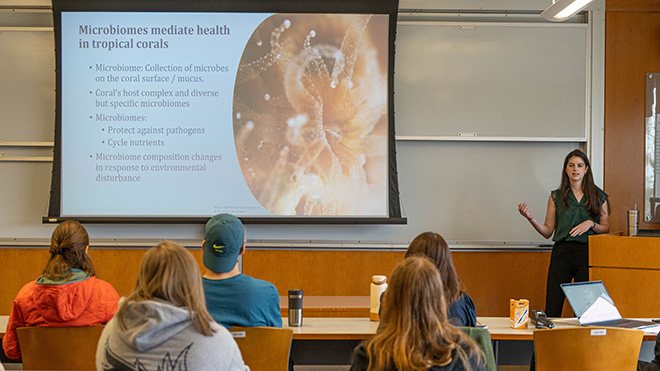
Saving Coral Reefs
By participating in research beginning her first year at Roger, senior Meriel McGovern, a Marine Biology major and Mathematics minor from Long Valley, N.J., said she’s grown in many ways: from improving her public speaking skills and learning how to effectively communicate her research for different audiences to writing a manuscript for publication.
At SASH, McGovern presented her Honors Capstone project, based on her senior thesis, where she ran experiments on local coral Astrangia poculata, studying its microbiome during quiescence – or winter dormancy – to learn how it responds to environmental disturbance.
As part of her research, McGovern, who worked with Associate Professor of Marine Biology Koty Sharp, simulated winter temperatures in an aquarium system that she designed in Roger’s Wet Lab. Results from this study may provide solutions for helping tropical corals suffering from climate change and other environmental issues.
“Even though this research focused heavily on coral, knowing how to design an experiment and all the techniques I learned, like DNA extraction, are very applicable to other research,” she said. “There’s a lot I can take away from this and apply to future positions.”
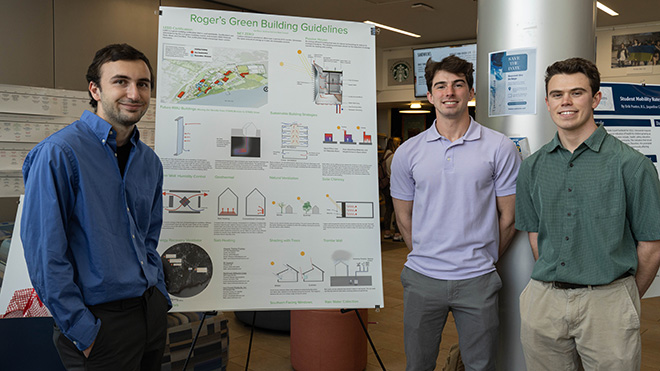
Creating a More Sustainable Campus
Knowing that over the next 10 years RWU has proposed to construct new buildings on campus, three senior Architecture majors spent their semester researching ways to make sure those structures can be as sustainable as possible.
As part of their Sustainability 401 class project, “Roger’s Green Building Guidelines,” Joe Bucci, of East Islip, N.Y.; Andrew Hall, of Middletown, Conn.; and Matt Carlson, of Glocester, R.I., all Sustainability Studies minors, proposed ways to make the new buildings greener and garner a STARS Silver rating from the Association for the Advancement of Sustainability in Higher Education. (RWU earned a STARS Bronze rating in recognition of our sustainability achievements earlier this year.)
After researching sustainable building systems, including solar chimneys and natural ventilation, they illustrated a few options shown on their poster (pictured above). They hope to see these ideas implemented in any new buildings on campus, Bucci said.
“This research has really helped me, not just academically, but also going into my career,” Hall said. “I’ll be able to take this experience and use it in the future. I hope to eventually open my own Architecture firm, and I really want to be focused on sustainability, so starting now has been helpful.”
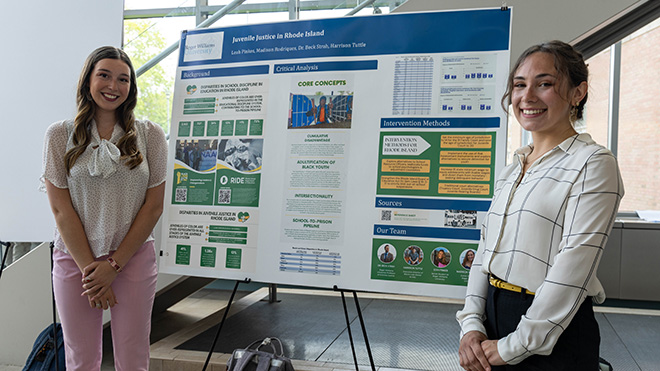
Advocating for Juvenile Justice in Rhode Island
Junior Madison Rodriques and senior Leah Pinkes want to see positive changes to the juvenile justice system in Rhode Island. As part of their project, Rodriques, a Criminal Justice major from Bristol, R.I., and Pinkes, a Marketing major from Holden, Mass., examined racial disparities in school discipline, courts, and the juvenile justice system in the state of Rhode Island, with the goal to create a report that will land on the desks of the state’s lawmakers.
According to the research, juveniles of color are over-represented in all stages of the juvenile justice system, including in the educational discipline system, which contributes to the school-to-prison pipeline. Rodriques and Pinkes proposed intervention methods that would change the status quo, including exploring alternatives to school resource officers, reallocating funds to school psychologists and adjustment counselors; raising the age of jurisdiction for Juvenile Court to 20; and increasing the state minimum wage to equip youth with livable wages.
“When I graduate, I want to work in juvenile justice reform,” Rodriques said. “Looking at data from out-of-school suspensions and racial disparities in education in R.I. has been helpful toward that goal. I’m hoping to make some changes as soon as I graduate.”
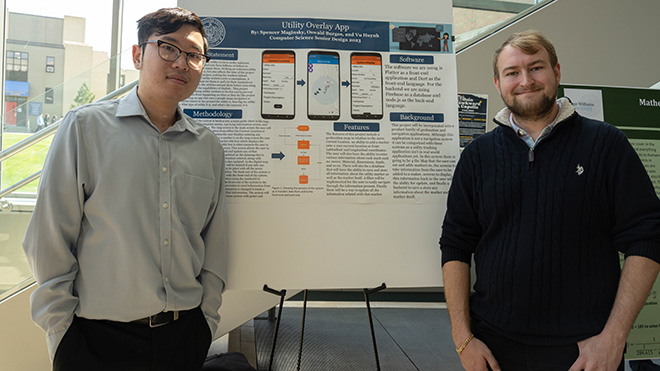
Utilizing Mobile App to Help Utility Workers
For their senior design project, Computer Science majors Vu Huynh, Spencer Magensky, and Oswald Burgos, designed a mobile app to help utility workers pinpoint existing underground utilities, such as power and water lines.
As Magensky, of Southampton, N.Y., explained, it’s common for utility workers to strike underground utility lines, which can cost them thousands of dollars to repair and may delay construction projects. To help solve this problem, the students created an app that uses Google Maps navigation to pinpoint where underground utilities are located and show them information including depth, size, and materials.
This project required the seniors to design the front-end, or client-facing, side of the app as well as the back end, which is where the data is stored, said Huynh, of Boston. “Usually, as students we don’t do both parts,” he said. “Last summer, I interned remotely with Cisco. This experience really showed me that working in a team is a lot different than working by yourself. It’s definitely a skill that will help with future endeavors.”
After he graduates, Magensky will work as a software engineer for Bay Computer Associates in Cranston, R.I., where he interned last summer, and said the design documentation and processes that he used for this project will be helpful in his future position.
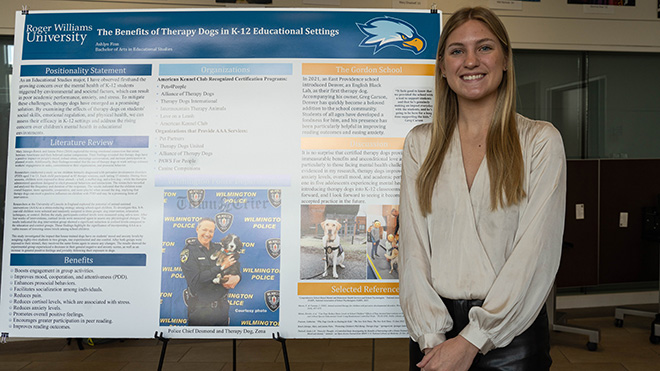
Improving Student Outcomes with Therapy Dogs
How can therapy dogs help K-12 learners? That’s the question senior Ashlyn Finn sought to answer with her research project, “The Benefits of Therapy Dogs in K-12 Educational Settings.”
Turns out, there are a lot of “pawsitives.” In her research, Finn, of Wilmington, Mass., looked at the effects of therapy dogs on students’ social skills, emotional regulation, and physical health as well as academic achievement. From reducing anxiety and improving mood, cooperation, and attentiveness to boosting literacy and reading outcomes, therapy dogs are emerging as a promising solution to helping students in the classroom.
As an Educational Studies major and Psychology minor, Finn said she’s seen firsthand the mental health and social-emotional challenges of K-12 students, which can lead to poor academic performance, anxiety, and stress.
“Doing this research opened my eyes to how prevalent mental health and social-emotional problems are in education,” Finn said. “This information is vital to future teachers. It’s important to know different ways you can help students who are going through these issues. Dogs are a great way to help. I look forward to seeing it become a more widely accepted practice.”
While Finn is still deciding what her future after Roger will look like, she said this project helped increase her interest in education.
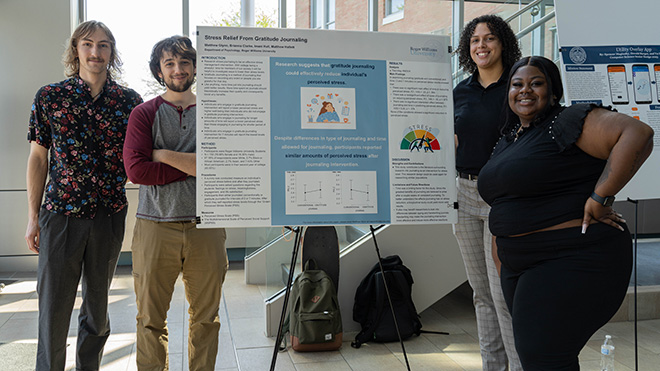
Investigating Gratitude Journaling as Stress Relief
With RWU students as participants, four seniors researched the effects that gratitude journaling can have on people’s stress levels.
Matt Glynn, a senior Psychology major from Walpole, Mass.; Bree Clarke, a senior Criminal Justice and Psychology double major from Berlin, Conn.; Imani Hall, a senior Criminal Justice and Psychology double major from Providence, R.I.; and Matthew Hallet, a senior Psychology major and Sustainability Studies minor from Grafton, Mass.; asked college students to spend two to seven minutes journaling and then asked them questions to see if their perceived stress had lessened. Research suggests that gratitude journaling – or a daily recording of events and/or people that you are grateful for – can effectively reduce stress.
Before starting law school in a year, Clarke plans to apply for human resources positions and said this research will apply to that field – in helping with complaints that may occur and assisting employees with stress-reducing techniques.
Glynn, who hopes to attend graduate school and pursue a research-related career, said that this project will definitely apply to his future endeavors. “This really brought us through the process of running an experiment,” he said.


